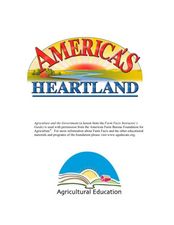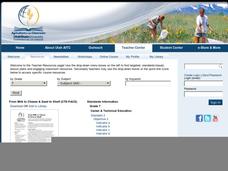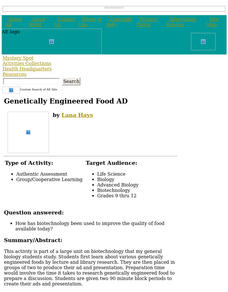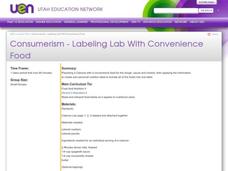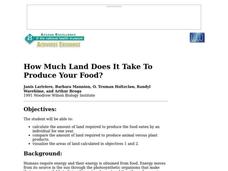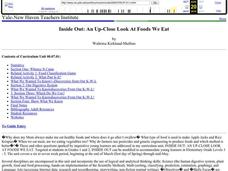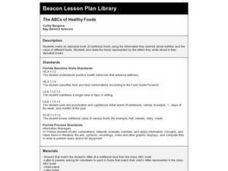Curated OER
Agriculture and the Government
Students study the government's involvement in the U.S. A's food production and make connections relating to farm programs. In this historical agriculture lesson, students read content and research significant information. Students then...
Curated OER
From Milk to Cheese & Seed to Shelf
Learn about food production by making cheese, seeing how a seed gets to a shelf, and discussing food safety. Budding agriculturalists complete several activities and learn about food production, biotechnology, food preservation,...
TED-Ed
Sugar: Hiding in Plain Sight
Did you know that you can find added sugars in three-quarters of the foods you find in grocery stores? Invite your learners to consider how much sugar exists in the food products we eat on a day-to-day basis, as well as to learn about...
Curated OER
Figuring Out Food Labels
Students identify various sources of nutritional information and evaluate accuracy of messages. They comprehend and identify misrepresentations in current food labeling. Pupils evaluate specific consumer products for truth in labeling....
Curated OER
Genetically Engineered Food AD
Students examine various genetically engineered foods by lecture and library research. They are then placed in groups of two to produce their ad and make a presentation on a food they have developed.
Curated OER
The Foods we Eat (Los Alimentos)
Sixth graders sing a song and create flashcards showing their favorite foods. In this Spanish "What do you like? lesson, 6th graders display Spanish foods using a document camera and graph their favorites.
Curated OER
Using Product Labels
Students examine food labels. They conduct a food label hunt to determine if specific foods are safe and acceptable for people with specific food allergies. They study a variety of food labels to determine whether or not they would...
Curated OER
Farm Products Help Me Grow
Young scholars view a display of empty food containers (or illustrations). They select a food and decide as a class if it has an animal or plant origin. Students view a display of common farm animals that are commonly eaten (cow, pig,...
Curated OER
Consumerism - Labeling Lab With Convenience Food
Pupils examine the differences between convenience food and food that has to be prepared in order to use it in another recipe. In groups, they make a calzone using only convenience food. After baking, they work together to make their...
Curated OER
Food Systems Feed the World
Learners discover how getting food from farm-to-fork involves several steps and many hands. In this interactive food chain lesson plan, students respond to a series of questions about food distribution then work collaboratively to create...
Curated OER
Food Choices: A Socio-Cultural Decision
Students discuss their food preferences. Using a flannel board and food models students describe what they would like to eat for dinner. Students compare their selections with their classmates. Students identify the nationality of ethnic...
Curated OER
Food Safety-Consumers Need the Facts
High schoolers begin by completing a survey asking them to rank their concerns about commercially prepared foods. They develop a definition of relative risk, and complete the "Pro or Con" worksheet. Students work in groups to make a...
Curated OER
How Much Land Does It Take To Produce Your Food?
Students calculate the amount of land required to produce the food eaten by an individual for one year and compare the amount of land required to produce animal versus plant products. They use calorie counting resources to compile the...
American Farm Bureau Foundation for Agriculture
Welcome to My American Farm!
Take a step into the virtual farm world and explore the impact farming has on our everyday eating habits. Future farmers discover the meaning of agriculture and the hard work that goes into providing food for us to enjoy. A computer game...
Curated OER
They're Tilling that Field Behind the Mall
Unfortunately, the article for which this resource was written is not available. You can, however, find another current document on agriculture and urban development for your class to read together, and then still follow the suggested...
Curated OER
Lesson: Living With the Farm Next Door
Discuss with learners why farms are growing in size and why there is sometimes conflict between farmers and their non-farming neighbors. Read the article, "Living With the Farm Next Door," and then craft letters to the editor from the...
Curated OER
Regulation and handling of animal products: a special challenge
Students examine how food safety affects sustainable animal production and marketing. In this agriculture lesson students complete several activities including one on groceries and the rules of animal products.
Curated OER
Food Webs
Students recognize interdependence in a food web by using yarn and notecards to create a food web and discussing what would happen if one of the organisms from a certain trophic level is removed.
Curated OER
Food Web Mystery
Pupils describe typical marine food webs, and explain why food is generally scarce in the deep-ocean environment. They discuss reasons that seamounts may support a higher density of biological organisms than would appear to be possible.
Curated OER
Inside Out: An Up-Close Look At Foods We Eat
Fourth graders identify the origins of meats and vegetables consumed by humans on a daily basis. They classify foods (meats, dairy products, grains...) and create a food pyramid.
Curated OER
A Coastal Arctic Food Web
Students create a food web of the arctic ecosystem. In this biology lesson, students explain how global warming affects this ecosystem. They explain how losing a species affects the entire community.
Curated OER
Food Production and Services
Young scholars explore the Family, Career and Community Leaders of America (FCCLA). In this FCCLA lesson, students research and design food-related businesses. Young scholars create business plans and present them to their classmates.
Curated OER
How Much of Each Nutrient Does Your Body Need, and How Can You Find Out What Is In Each Food?
Fifth graders practice reading food labels to find nutrients in foods. In this health lesson, 5th graders read food labels and discuss the recommended daily allowance of each nutrient. They compare this to the food pyramid and create a...
Curated OER
The ABCs of Healthy Foods
First graders, after reviewing the food pyramid, look for fat, sugar, and salt in food.
Other popular searches
- Food Production Flow Charts
- Food Production by Continent
- Hormones & Food Production
- Plant Food Production
- Food Production Chain
- Food Production Plan
- Energy and Food Production
- Tree Food Production
- Food Production Oil
- Mass Production Food
- Anthropology Food Production
- Bacteria in Food Production


